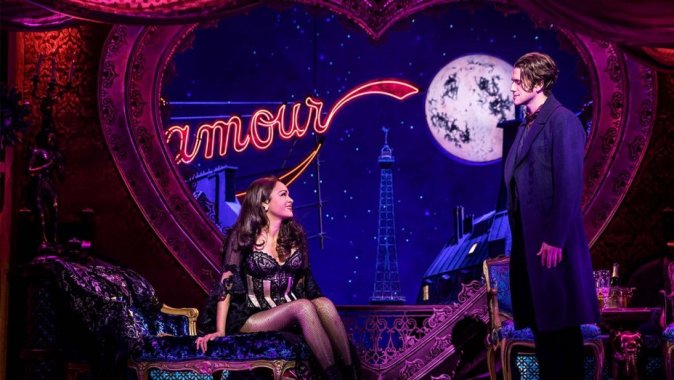Tony Award-winner Karen Olivo spent the last two hours and twenty minutes performing a matinee show of Moulin Rouge! The Musical on Broadway when we meet in July. Olivo plays Satine—the legendary courtesan of the Moulin Rouge; a role previously played by Nicole Kidman in Baz Luhrmann’s 2001 film.
Olivo’s signing autographs outside of the theater, still sporting Satine’s signature red lip. The first thing you notice about her is how present she is. She barely has time to cram dinner and a nap before she has to do it all over again, but she takes time to engage with fans who’ve taken over almost half the block to greet her. As I wait for my turn in the robust crowd, I hear someone thank her for representing the Latinx community on Broadway.
Over the next few months, Olivo would confront the doubts she had when she was first approached to play Satine in Moulin Rouge! The Musical—a Broadway musical based on Luhrmann’s film starring Kidman, Ewan McGregor, John Leguizamo and others.
“I didn’t assume that I would play Satine,” Olivo admits during our conversation in early March. “I was glad that they were making the musical because I was a huge fan of the movie, but I didn’t see a part for myself in it. I never thought that I would be a part of it and the creative team called and said they were reimagining the show and wanted to see me specifically.”

From In the Heights (the show that made her a star) to the 2009 revival of West Side Story (the show that earned her a Tony award), Olivo’s stage work has garnered her a legion of devotees. Moulin Rouge! marks Olivo’s return to Broadway after seeking catharsis and consequently creating a new life for herself in Wisconsin over the last seven years.
But she kept herself busy during that time, so don’t call this a comeback. In 2016, she reprised the role of Anita in the Austrian production of West Side Story and joined the Chicago company of Hamilton as Angelica Schuyler that same year.
Olivo is also an educator whose biggest pursuit is to empower students of various age groups to “feel confident in discovering who they are meant to be and not who [she’s] trying to make them into.”

“The best thing that we can do is just reassure people that the way they are is okay and is exactly what they’re supposed to be.”

Karen Olivo—candid, decisive, and relatable—is interested in complex characters. She enjoys Satine’s agency, how things aren’t always what they seem with her, and how this role “causes people to think about their own choices.”
“Being a woman of color and also being a woman in her 40s, viability and agency are things you really start to contemplate later on in life,” she explains. “My background is one that comes from somebody who was never given anything, so it became something that was very easy to inject into my Satine.”

“She’s a performer whose side hustle is being a sex worker, and that’s the impetus for all of her actions. It all hinges on trying to keep her chosen family together and she does that by using what she has used her entire life to keep herself either safe or to advance in life… It’s surprising how she has to have so many different masks.”
Every time she enters a room, Olivo carries history with her. The Asian American Performers Action Coalition reports that 33% of all available roles in the 2016-17 season went to “minority actors” with a mere 5% of those going to Latinx actors. Meanwhile, the Broadway League states that 74% of ticket buyers are white.
“It weighs heavily on me that I’m one of the few,” Olivo tells Remezcla. “It also weighs heavily on me that I’m someone who has been chosen to play a role that was originated by a Caucasian woman. I see girls who look like me who thank me for showing them as being a positive representation of what it means to be a woman of color in this industry.”
It’s the self-assuredness she projects when we speak that helped her convince casting directors she was right for the role. It also aids her onstage as she belts out song after song while brushing off naysayers.
When you “make art despite criticism, you succeed,” she says. Her readiness for “stories that are more encompassing of a well-rounded group of people” proves her need to hold the industry accountable for its exclusionary practices.
“When we open up the content and we start looking at stories from people of all different walks of life and start making those things profitable, they become things that people want to invest in and more of those stories are told,” she says, adding that “we aren’t only populating the stage with people who can play those roles—we’re also showing the world a different version of our medium.”
This representation isn’t a pandering moment or a token character. Olivo’s embodiment of Satine shows us what it could feel like when we move forward collectively as conversations about representation and equity make their way into popular culture.
Our lives have been torn apart since we spoke. The effect of COVID-19 has been totalizing and it’s only human to mourn Broadway’s shutdown.
“You spend so much time with these people, and we have such an intimate relationship, that when they’re pulled from you, it feels very unnatural,” Olivo tells Variety from Wisconsin.
If anyone knows about the power of solidarity, it’s theater people. The Broadway community has mobilized to raise money for The Actors Fund and Broadway Cares/Equity Fights AIDS to assist workers in the industry facing job loss because of COVID-19.
Now more than ever, I’m reminded that there are things to be hopeful for, like having Olivo lead Moulin Rouge! again. This Broadway season is no longer what we envisioned but hopefully, it will become more than any of us could have imagined.




